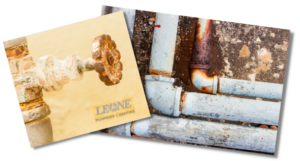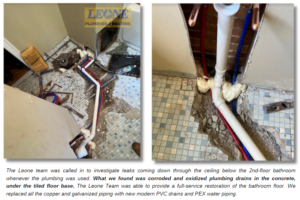Saving Your Home from Corroded Pipes
 Are you aware that corroded pipes could be silently damaging your home? If left unchecked, corroded pipes can lead to costly repairs, cause water leaks, and even create potential health hazards. That’s why early detection and proper maintenance of your plumbing system are crucial. In this article, we will share expert tips on how you can save your home from the perils of corroded pipes.
Are you aware that corroded pipes could be silently damaging your home? If left unchecked, corroded pipes can lead to costly repairs, cause water leaks, and even create potential health hazards. That’s why early detection and proper maintenance of your plumbing system are crucial. In this article, we will share expert tips on how you can save your home from the perils of corroded pipes.
The Importance Of Early Detection And Proper Maintenance For Home Pipes
Maintaining the integrity of your home’s plumbing system is essential to protect your investment and ensure the comfort and safety of your family. Corroded pipes can wreak havoc on your property, leading to a host of issues that can be both financially and emotionally draining. By taking proactive measures and staying vigilant, you can save your home from the damaging effects of corroded pipes. Corrosion occurs when metal pipes interact with various factors such as water, chemicals, and even the soil surrounding them. Over time, this interaction leads to a breakdown of the pipe’s structure, causing leaks, reduced water pressure, and potential health risks due to contaminated water. Early detection is key to minimizing the extent of damage and preventing further complications.
Proper maintenance is equally important in ensuring the longevity of your plumbing system. Regular inspections, routine maintenance, and prompt repairs are essential to prevent corrosion from taking hold and causing significant damage. By investing time and effort in early detection and proper maintenance, you can save yourself from the headaches and financial burden associated with corroded pipes.
Common Causes Of Pipe Corrosion
Understanding the root causes of pipe corrosion is essential in preventing and managing this destructive issue. Various factors contribute to the corrosion of pipes, including:
Age of Your Home
Older homes often have plumbing systems that are more susceptible to corrosion due to the materials used at the time of construction. Galvanized steel pipes, commonly found in older properties, tend to corrode more rapidly than newer materials such as copper or PEX.Water Quality
The quality of the water flowing through your pipes can significantly impact their lifespan. High levels of acidity, alkalinity, or mineral content can accelerate the corrosion process. Additionally, water with high chloride or sulfate levels can be particularly corrosive to certain metals.Chemicals and Environmental Factors
Exposure to harsh chemicals, such as cleaning agents or fertilizers, can corrode pipes over time. Environmental factors, such as high humidity or soil acidity, can also contribute to accelerated corrosion rates.
Signs of Corroded Pipes
Now that you’re aware of the causes, let’s explore the telltale signs that indicate your pipes may be corroded. Early detection of corroded pipes is crucial in preventing further damage and costly repairs. By being aware of the following signs, you can proactively address any issues before they escalate:
Discolored Water
If you notice a change in the color of your tap water, such as brown or yellowish tones, it could be an indication of corroded pipes. The presence of rust or other contaminants in the water is a clear sign that your pipes are deteriorating.
Low Water Pressure
Reduced water pressure can be a result of corroded pipes. As the pipes degrade, they become narrower, restricting the flow of water. If you’re experiencing consistently low water pressure throughout your home, it’s worth investigating the condition of your pipes.
Frequent Leaks
Corroded pipes are more prone to developing leaks. If you notice recurring leaks in your plumbing system, it’s a strong indication that the pipes are deteriorating and in need of attention. Ignoring these leaks can lead to extensive water damage and mold growth.
Preventive Maintenance Tips For Pipe Longevity
Proactive maintenance is key to preventing pipe corrosion and extending the lifespan of your plumbing system. Here are essential tips for maintaining healthy pipes:
- Regular Cleaning: Flush your pipes periodically by running hot water through them to remove any built-up sediment or debris. This simple maintenance practice helps prevent corrosion-causing particles from accumulating and damaging your pipes.
- Water Softening: If your water supply has a high mineral content, consider installing a water softener. Water softeners remove excess minerals that can contribute to pipe corrosion, thereby protecting your plumbing system.
- Avoid Harsh Chemicals: Be mindful of the cleaning agents and chemicals you use in your home. Harsh chemicals can corrode pipes over time. Opt for environmentally friendly alternatives and avoid pouring corrosive substances down drains or toilets.
Implementing these preventative measures can significantly reduce the risk of pipe corrosion. However, in cases where corrosion has already taken hold, repair or replacement may be necessary.
Replacing Corroded Pipes
In severe cases of corrosion, pipe replacement may be the most suitable solution. This involves removing the corroded pipes and installing new ones made from materials resistant to corrosion. When it comes to pipe replacement, selecting the right materials is crucial for long-term durability and corrosion resistance. Here are two widely used options:
- Copper Pipes: Copper pipes have long been a popular choice due to their excellent corrosion resistance and durability. They are suitable for both hot and cold water supply lines and have a proven track record of reliability.
- PEX Pipes: Cross-linked polyethylene (PEX) pipes are gaining popularity for their flexibility, ease of installation, and resistance to corrosion. PEX pipes are highly durable and suitable for both residential and commercial applications.
Hiring A Professional Plumber For Pipe Maintenance And Repairs
While DIY methods and proactive maintenance play a crucial role in preventing pipe corrosion, there are situations where professional expertise is necessary. Hiring a professional plumber offers several benefits:
- Expert Knowledge: Professional plumbers possess specialized knowledge and experience in identifying, addressing, and preventing pipe corrosion. Their expertise ensures accurate assessments and effective solutions for your plumbing system.
- Time and Cost Savings: Engaging a professional plumber saves you time and money in the long run. Their efficient repairs and proactive maintenance help prevent extensive damage and costly repairs down the line.
- Peace of Mind: By entrusting your plumbing system to a professional, you can have peace of mind knowing that your pipes are in capable hands. Professional plumbers adhere to industry standards and deliver quality workmanship.
 As Rochester, New York’s best plumbers, it is our goal to help you protect your home and your business from the perils of corroded pipes. We provide the right solution for your plumbing pipe maintenance and repair concerns. Don’t wait for problems to arise – start protecting your home today! Contact us and schedule an appointment.
As Rochester, New York’s best plumbers, it is our goal to help you protect your home and your business from the perils of corroded pipes. We provide the right solution for your plumbing pipe maintenance and repair concerns. Don’t wait for problems to arise – start protecting your home today! Contact us and schedule an appointment.